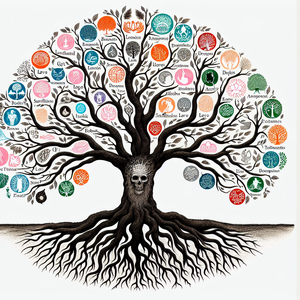From Cigarettes to Culture: How Duke's Wealth Shaped Southern Identity

In the late 19th century, the Southern economy was in a state of transition, moving away from the antebellum reliance on cotton towards a diversified agricultural economy that increasingly included tobacco. Recognizing this shift, Duke leveraged his family's tobacco business and transformed it into a colossal enterprise. By 1890, he had established the American Tobacco Company, which quickly monopolized the market and established cigarettes as a staple of American life. Duke's innovative marketing strategies, such as the introduction of pre-rolled cigarettes and aggressive advertising campaigns, fueled the growing demand for tobacco products. For instance, the success of brands like Duke's "Lucky Strike" and "Camels" was a direct result of his marketing prowess, which helped cultivate a culture of smoking that became ingrained in Southern society. The rise of the tobacco industry ultimately provided a significant economic boost to the region, creating jobs and generating wealth that would shape local communities.
Cultural Implications of Tobacco Production
Tobacco production was more than an economic endeavor; it was woven into the very fabric of Southern life. For many, particularly Black laborers who worked the fields, tobacco farming represented both a livelihood and a symbol of the region's socio-economic dynamics. The labor-intensive nature of tobacco cultivation meant that it provided employment opportunities for thousands, but it also perpetuated a system of exploitation, particularly in the context of the segregated South. Duke's wealth allowed for the development of infrastructure and social institutions, which were vital for many Southern towns. However, this prosperity also reinforced existing social hierarchies. The reliance on tobacco as a cash crop entrenched racial divisions that would persist well into the 20th century. Duke's contributions to the economy, therefore, were a double-edged sword: they brought prosperity to some while perpetuating inequality and injustice for others.
Duke's Philanthropy and Cultural Legacy
In addition to his business acumen, James Buchanan Duke is remembered for his philanthropic efforts, particularly in the field of education. His substantial endowments led to the founding of Duke University in 1924, which became a symbol of educational advancement in the South. Duke envisioned a more enlightened South, and through his contributions, he sought to foster a new generation of leaders who could redefine the region's identity. The establishment of Duke University marked a significant cultural shift, moving the South away from its agrarian roots and towards an emphasis on intellectual growth and innovation. This shift was critical in reshaping the narrative around Southern identity—from one dominated by poverty and ignorance to one that embraced progress and development. The university has since become a significant institution, playing a vital role in fostering discussions around equity, social justice, and the complexities of Southern history.
The Enduring Influence of Duke's Wealth on Southern Identity
The legacy of James Buchanan Duke's wealth continues to resonate in the modern South. While the tobacco industry has faced significant decline due to health concerns and changing societal attitudes, its historical impact remains a part of Southern identity. Cultural practices surrounding tobacco, once seen as symbols of social status and sophistication, have evolved but still echo in various aspects of Southern life. Furthermore, the philanthropic legacy of Duke's investments in education persists, particularly through institutions like Duke University. These entities continue to address contemporary challenges of equity and inclusion, striving to create a more just society. As the South grapples with its complex history, the influence of figures like Duke remains a critical element in understanding the region's evolving identity.
James Buchanan Duke's financial empire not only revolutionized the tobacco industry but also left an indelible mark on Southern culture and identity. His innovative business practices, combined with his philanthropic initiatives, reshaped the economic and social landscape of the South in profound ways. While the tobacco industry has faced significant challenges, its impact on Southern identity endures, reflecting both the achievements and complexities of the past. Understanding this legacy is essential for grasping the intricate tapestry of Southern culture as it continues to evolve in the 21st century, revealing the intertwined nature of prosperity, exploitation, and cultural transformation that defines the region's history.
Tobacco Industry Analyst
Philip Morris International, Altria Group, British American Tobacco
Core Responsibilities
Analyze market trends and consumer behavior related to tobacco products.
Provide insights into regulatory developments and their economic implications.
Prepare reports that assess the competitive landscape of the tobacco industry.
Required Skills
Strong analytical and quantitative skills, with proficiency in statistical software.
Familiarity with the tobacco market, including historical and current trends.
Excellent communication skills for presenting findings to stakeholders.
Cultural Historian specializing in Southern Identity
Universities, historical societies, cultural institutions
Core Responsibilities
Conduct in-depth research on the cultural and socio-economic impacts of tobacco in the South.
Publish articles and papers that explore historical narratives and identities shaped by tobacco production.
Collaborate with educational institutions to develop programs centered on Southern history.
Required Skills
Advanced degree in history, sociology, or a related field.
Strong research skills with the ability to interpret primary sources.
Proficient in academic writing and public speaking.
Agricultural Economic Advisor
USDA, agricultural consulting firms, non-profit organizations
Core Responsibilities
Provide economic analysis and policy recommendations regarding the agricultural sector, focusing on cash crops like tobacco.
Assess the financial viability of tobacco farming practices and advise on sustainable methods.
Work with government agencies to develop programs supporting farmers in transitioning to diverse crops.
Required Skills
Background in agricultural economics or a related field.
Experience in economic modeling and forecasting.
Strong understanding of agricultural policies and market dynamics.
Tobacco Policy Advocate
American Lung Association, Campaign for Tobacco-Free Kids, local health departments
Core Responsibilities
Engage in lobbying efforts to influence legislation related to tobacco regulation and public health.
Develop and implement advocacy campaigns that raise awareness of tobacco's social and health impacts.
Collaborate with public health organizations to promote tobacco cessation initiatives.
Required Skills
Knowledge of public health policy and tobacco-related issues.
Strong communication and negotiation skills.
Experience in grassroots organizing and coalition-building.
Philanthropy Program Manager
Foundations, non-profits, educational institutions
Core Responsibilities
Oversee initiatives funded by tobacco industry philanthropy, focusing on education and community development.
Assess the impact of philanthropic efforts on Southern communities historically influenced by tobacco economics.
Develop partnerships with educational institutions to enhance community outreach programs.
Required Skills
Experience in program management and community relations.
Strong grant writing and fundraising skills.
Ability to analyze program outcomes and generate reports for stakeholders.


